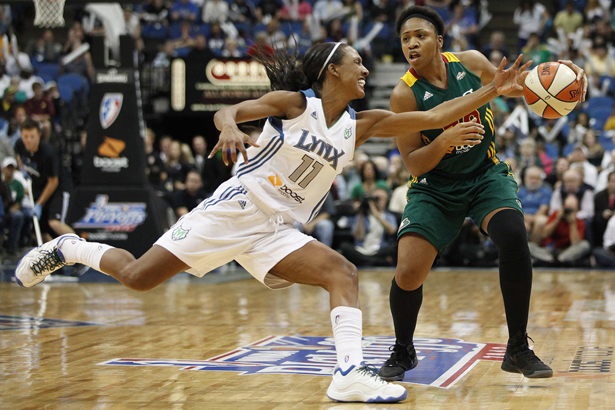
Seattle Storm guard Tanisha Wright (30) protects the ball against Minnesota Lynx guard Candice Wiggins (11) in the second half of Game 3 of their WNBA basketball first-round playoff series, Tuesday, Oct. 2, 2012, in Minneapolis. The Lynx won 73-72. (AP Photo/Stacy Bengs)
In the same year that Title IX celebrates its 40th anniversary, the Bikini Basketball Association announced its launch. Following in the footsteps of the Lingerie Football League, the BBA will feature six teams of half naked competitive female athletes.
Title IX has been critical in providing numerous female athletes with the ability to play sports at their respective schools, but there’s a larger issue when it comes to women’s sports that needs to be addressed. Merely existing isn’t enough—we should expect more than the offensive and hyper sexualized norms that permeate sports culture.
My gripe isn’t with the women who opt into playing for the league, but with the larger systems and economic forces that circumscribe choices and channel female athletes into choosing to play ball in a bikini for pay. We live in a culture where sex sells, especially when it comes to women’s sports and the (frequently) male executives who oversee their marketing and branding.
In an August 2011 article for The Nation titled “Sex Sells Sex, Not Women’s Sports,” Mary Jo Kane writes, “Scholars have long argued that a major consequence of the media’s tendency to sexualize women’s athletic accomplishments is the reinforcement of their status as second-class citizens in one of the most powerful economic, social and political institutions on the planet.”
We can do better and expect more as sports fans, starting on college campuses.
We can start to eliminate this problem at the collegiate level by paying more attention to women’s college basketball. Sure, Geno Auriemma and the Uconn women have become household names, but they’re not the only women’s team who play college basketball worthy of our attention. Male athletes on campus don’t have to fight to be taken seriously, but they can play a positive role in encouraging fans to watch women’s college basketball instead of sexist spectacles like the BBA.
There should be great concern about what this Bikini Basketball Association says about us as individual fans and what it says about our society at large. It sends a message that we only take women’s sports seriously when players prance around nearly nude. Colleges and universities nationwide can become role models by speaking out against this standard and, in turn, encouraging a better environment for their own players.
Basketball season is around the corner. College teams are gearing up for exhibition and regular season games starting in November. Instead of perpetuating an ignorant cycle about sexuality and female athletes, challenge the status quo: refuse the expectations set by the BBA, pick a women’s college basketball team, and cheer them on this season.


